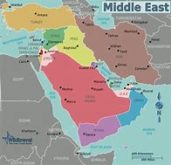Al-Monitor – This week Iran commemorated the two-year anniversary of the Jan. 3 US drone strike which killed Iranian Revolutionary Guards Commander (IRGC) Quds Force Commander Qasem Soleimani and Abu Mahdi al-Muhandis, deputy commander of the Iraqi Popular Mobilization Forces (PMF), in Baghdad, with speeches, threats and rockets targeting US bases in Iraq.
- Gen. Esmail Ghaani, Soleimani’s replacement, vowed retaliation, saying “We will get revenge that you will not forget for the rest of your life.”
- Iran-backed forces in Iraq and Syria attacked facilities hosting US-led international coalition forces against the Islamic State, as Shelly Kittleson and Jared Szuba report.
- An Iraqi PMF Commander told Ali Hashem that these attacks are meant to send “a harsh message to the Americans while making sure no drop of blood is spilled,” and also provide a “show of power” in the Iran nuclear talks taking place in Vienna.
- In Gaza, Mahmoud al-Zahar, member of Hamas politburo, during Soleimani’s commemoration ceremony, said that the IRGC commander “was the first to fund the resistance government formed after the 2006 elections to pay the salaries of its employees, aid poor families and back the resistance programs,” Mai Abu Hasaneen reports.
- Need to know: US mission in Iraq: There are approximately 2,500 US troops in Iraq and 900 in Syria. As of Jan. 1, US troops are no longer in a combat mission in Iraq, and will now be focused on training, advising, assisting, and intelligence-sharing. The shift “does not impact operations against ISIS or logistics in Syria.”
…while ‘bits of progress’ in nuclear talks
Iran’s days of rage don’t extend to the Iran nuclear talks taking place in Vienna.
French Foreign Minister Jean-Yves Le Drian said on Jan. 7, that he remains “convinced” a deal can still be reached and “bits of progress have been made in the last few days.”
Earlier this week, US State Department spokesperson Ned Price noted, “There has been some progress relative to the beginning of December in identifying the hard issues left to be negotiated,” as we report here.
…and Israel plans for an Iran nuclear deal
In a “complete about face,” reports Ben Caspit, Israel now assesses that the world powers and Iran will agree on a new nuclear accord this year.
And Israel can live with that, a senior Israeli security official told Caspit, given the close collaboration between Washington and Jerusalem.
- “The Americans completely understand our concerns and explain to us that if the Iranians rush to nuclear capability once the agreement expires, they would will be dealt with aggressively,” the official said.
- The US will “bolster and improve our military advantage over the region and they have promised that if Iran achieves nuclear breakthrough at any given moment, they would block it with all the means at their disposal.”
- Israel will meanwhile press for an extension of sunset clauses, which end restrictions on Iran’s nuclear program in 2025 and 2030, which Israel has always considered the greatest flaw in the Joint Comprehensive Plan of Action (JCPOA).
- Israel is pressing for aggressive implementation of “snapback sanctions,” meaning if Iran violates the agreement, the US would trigger a mechanism to reimpose sanctions on Iran, Barak Ravid of Axios reports.
- “We can expect that if an agreement is reached, it will be accompanied by a significant American package for Israel and its allies in the Middle East,” concludes Caspit. “The agreement with Iran may include additional clauses enhancing it — or it may not. Either way, Israel seems to have accepted the fact that it does not stand a chance of diverting the march of history.”
Need to know: Iran nuclear deal
- Link to the JCPOA and UN Security Council resolution 2231(2025) here.
- The crux of the deal is economic sanctions relief for Iran in return for Iran’s compliance with constraints on its nuclear program, enforced by the International Atomic Energy Agency (IAEA), to assure that Iran does not acquire a nuclear weapon.
- The Trump Administration withdrew from the JCPOA in May 2018, so the US delegation is not “in the room” at the ongoing nuclear talks in Vienna.
- The remaining parties to the JCPOA are Iran, China, France, Germany, the Russian Federation, the United States, and the European Union.
- The IAEA reported in August 2021 that Iran was enriching uranium at 60 percent, well above the 3.67 percent cap in the JCPOA. HEU at 90 percent purity is required for nuclear weapons. In September, the IAEA said that Iran’s restrictions on access to its facilities were seriously compromising the agency’s oversight.
 Shabtabnews In this dark night, I have lost my way – Arise from a corner, oh you the star of guidance.
Shabtabnews In this dark night, I have lost my way – Arise from a corner, oh you the star of guidance.



